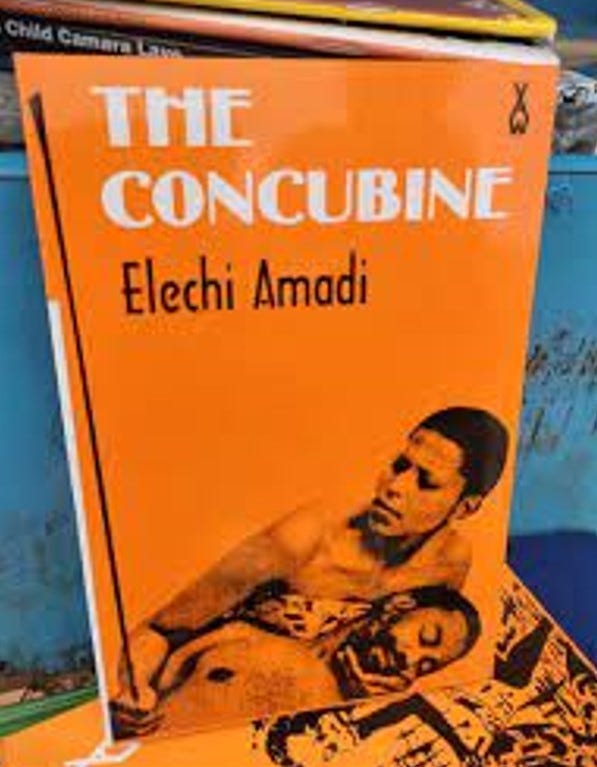A Captivating Trip: Life in Past Nigeria
Book Insights: Elechi Amadi takes us on a trip into pre-colonial Nigeria of the past.

The Concubine, written by acclaimed Nigerian writer Elechi Amadi, provides a preview of life in Nigeria prior to the arrival of Europeans.
Just like riding or driving in a new car, reading this novel is an exhilarating experience. You and your car both feel like repeating the trip at the end of each journey.
Even though I know not to judge a book by its cover, I still searched the internet for the original edition's cover. I read the book for the first time in 1984. My latest reading was on my e-book app.
The Concubine is a beautiful love story with a sweet-to-bitter-to-sweet ending.
Beautiful, virtuous, and flawless in character, Ihuoma (as later revealed through the medicine-man’s divination) was the wife of the Sea King. Against his wishes, she reincarnated through birth to live with humans. Unknown to her and her denizen of adoring suitors, the Sea King will not permit her to marry any mortal man.
Hear her,
“These things are strange and almost funny. I certainly don’t feel like a daughter of the sea.”
Ekwueme, the hero of the story, passed away on the evening before his marriage to Ihuoma, his lovely heroine (the unassuming Sea Goddess in human form).
This story of typical pre-colonial African society was still delightful despite the sad deaths.
For long, Ihuoma tried to shoo off her relentless lover because of tradition and propriety.
“Nnenda, my sister, you are a woman as I am. We don’t often make mistakes as regards men’s feelings, do we? Ekwueme’s advances, though not very frequent, are very serious. He almost frightens me. Do you know that in the last three days, he has been coming to chat with me at the farm?”
“No, indeed.”
“Well, you now see what I mean. Worse still, he has not been getting on well with his wife. People will heap blame on me on the least suspicion. Then I think I should die.”
“Don’t talk so, my sister. I will speak to him.”
“Make him realize that I do not hate him. Indeed, he ought to have realized that by now. Tell him I respect and admire him, but that anything beyond that will bring shame on us both.”
“I will do that,” Nnenda said, supporting her chin in her left palm. Evidently, she was sharing her friend’s embarrassment to the full.
“Or do you think I am being unduly stem?” Ihuoma asked, those tiny creases appearing on her brow.
“At first I thought so,” Nnenda said.
‘No. He is still pestering me. It will lead to no good Ahurole is my village girl. Why should I come between her and Ekwueme? Besides, I can’t bear to be the subject of any unpleasant gossip in this village. I have told him I can’t marry him. I can’t be his mistress either. The matter should end there. Tell him that, please.”
As her prestige mounted, its maintenance became more trying. She became more sensitive to criticism and would go to any lengths to avoid it.
The women adored her. Men were awestruck before her. She was becoming something of a phenomenon. But she alone knew her internal struggles. She knew she was not better than anyone else.
She thought her virtues were the products of chance. As the days went by, she began to loathe her so-called good manners. She became less delighted when people praised her. It was as if they were confining her to an ever-narrowing prison.
While Ihuoma resisted all his advances, carrying herself with grace and dignity, Ekwueme was daring in pursue of her hand in marriage despite the ominous warning about the unseen Sea King.
For me, Ekwueme’s vow to defy the Sea King is one of many interesting scenarios in this novel.
Here Ekwueme discusses with his father his resolve to proceed with the marriage despite gloomy predictions.
Dede (father), I do not know whether you believe this or not. It does not matter. One thing is clear, I shall marry Ihuoma. She is a human being and if marrying a woman like her is a fatal mistake, I am prepared to make it.
If I am her husband for a day before my death my soul will go singing happily to the spirit world. There also I shall be prepared to dare the wrath of four hundred Sea Kings for her sake.
Our heroine is in the class of other remarkable women from my favorite classic novels. These include Tess in Thomas Hardy’s, Tess of the D’Urbervilles, Margaret in George Eliot’s, Mill on the Floss, and Scarlett in Margaret Mitchell’s, Gone with the Wind.
Against the odds and norms that disallow their marriage, Ihuoma and Ekwueme fell in love.
He tried to placate the Sea King with sacrifices on the day before the marriage. Unfortunately, Ekwueme died in a fluke accident that could only have been caused by the implacable Sea King (though not stated as such in the novel).
Takeaways
The Concubine depicts a society where traditional rules and culture regulate, strengthen, and help to bind the people together.
It also showcases how the life of mortals is influenced by forces and factors often beyond human understanding or control.
Even though their love pathway was threatened with loss and death, the two lovers had the courage to pursue it. For me, that is the greatest lesson.
The insights shared here are part of my essay, A Re-read of 3 Great African Classics. I here presented The Concubine in its more than deserving standalone review.
Thanks for your reading time.
If you enjoy this piece, support my writing by chipping in to buy me a Substack subscription. Click here.




